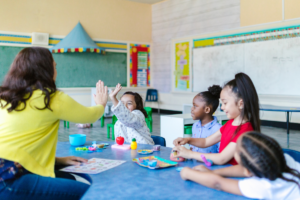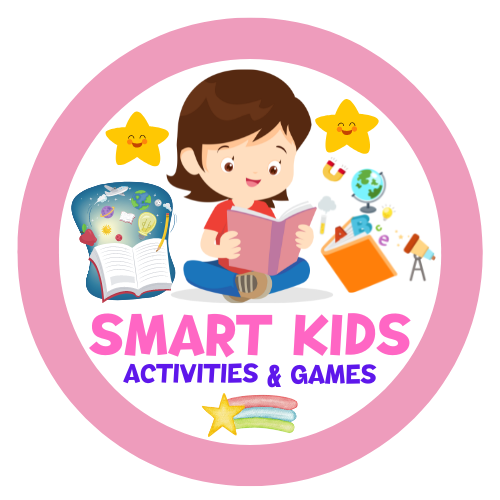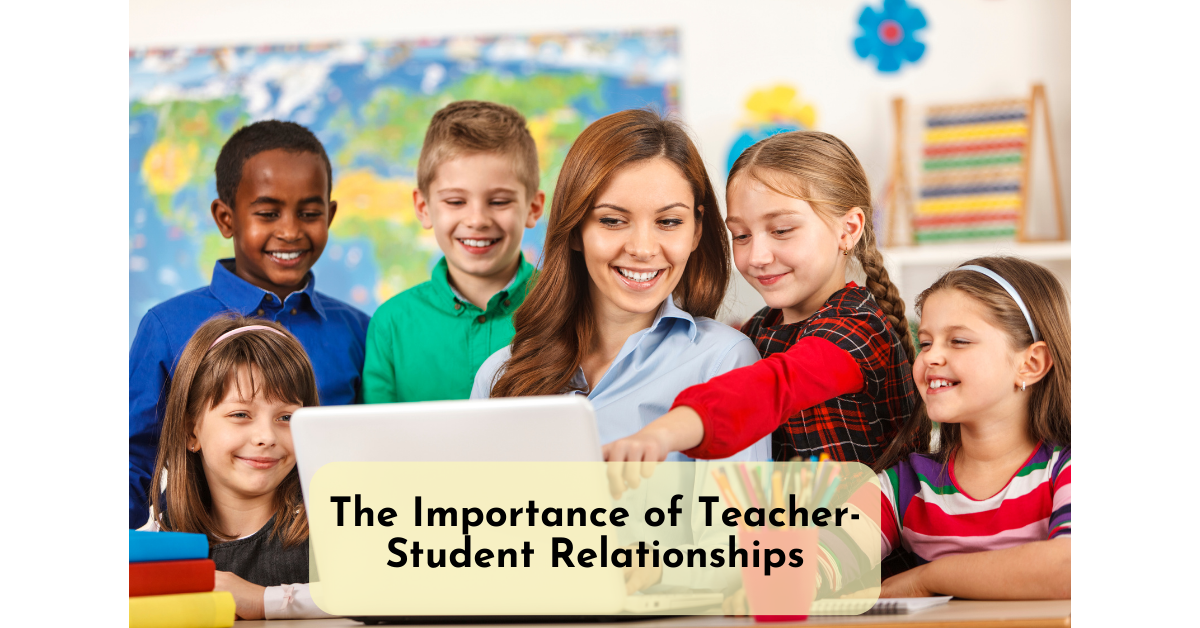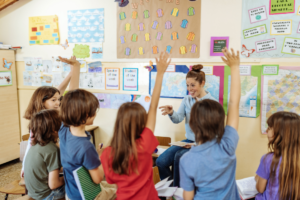Key Takeaways:
- The teacher-student relationship is essential for academic and social performance
- Close relationships with teachers lead to increased student engagement and motivation
- Positive teacher-student relationships promote students’ social skills and resiliency
- Teachers who foster positive relationships create a nurturing learning environment
- Understanding students’ needs is crucial for building strong connections
The Benefits of a Strong Teacher-Student Relationship
A strong teacher-student relationship has a profound positive impact on both teaching practices and academic outcomes. When students feel cared for and valued by their teachers, they are more motivated to learn and actively participate in the classroom. This increased motivation leads to better academic achievement and overall student engagement. Teachers who establish positive relationships with their students are more likely to employ high-impact teaching practices that support student success. These practices may include personalized instruction, tailored feedback, and differentiated learning activities. Such approaches effectively address individual student needs and facilitate optimal learning. Moreover, a strong teacher-student relationship enhances the social-emotional development and self-regulation skills of students. When students have a positive connection with their teacher, they are more likely to feel safe, secure, and supported. This creates an environment conducive to social-emotional growth and the development of skills like self-control, empathy, and responsible decision-making.“A strong teacher-student relationship positively influences academic outcomes, as well as fosters social-emotional development and self-regulation skills.”To further highlight the benefits of a strong teacher-student relationship, here’s a table illustrating the positive impact of such relationships:
| Benefits of a Strong Teacher-Student Relationship |
|---|
| Improved academic achievement |
| Increased student motivation and engagement |
| Enhanced social-emotional development |
| Development of self-regulation skills |
Building Strong Connections Between Teachers and Students
Developing positive relationships with students is vital for fostering a healthy teacher-student relationship and building strong connections. Teachers play a crucial role in creating an environment where students feel valued, respected, and supported. To establish these relationships, teachers should demonstrate responsiveness, respect, and care towards their students. One of the key factors in building strong connections is showing genuine interest in the students’ success. By actively engaging in their academic progress, teachers can provide tailored support that meets their individual needs. This includes understanding their backgrounds, interests, and academic levels. In order to effectively connect with students, teachers should strive to create a positive classroom climate. This can be achieved by promoting a culture of inclusivity, where every student feels welcomed and accepted. Encouraging students to be caring and respectful towards one another fosters a supportive environment that enhances the teacher-student relationship.Benefits of Building Strong Connections Between Teachers and Students
Building strong connections between teachers and students has numerous benefits that positively impact both academic and personal development.
- Enhanced Learning Experience: Students who have a strong relationship with their teachers are more engaged in learning and exhibit higher levels of motivation. When students feel valued and supported by their teachers, they are more likely to actively participate and take ownership of their education.
- Improved Academic Achievement: Research has shown that positive teacher-student relationships have a direct positive impact on academic performance. Students who have strong connections with their teachers demonstrate better academic outcomes and achieve higher grades.
- Social-Emotional Development: Building strong connections between teachers and students contributes to students’ social-emotional development. These relationships provide a supportive space for students to develop important skills such as empathy, communication, and self-regulation.
- Improved Classroom Climate: When teachers foster strong connections with their students, it creates a positive classroom climate. Students feel comfortable expressing their ideas and opinions, leading to greater collaboration and a sense of belonging.
Success Stories: Building Strong Connections in Real Classrooms
| Teacher | Student | Impact of Strong Connection |
|---|---|---|
| Ms. Johnson | Emily | Through regular check-ins and personalized support, Ms. Johnson built a strong connection with Emily. As a result, Emily’s confidence grew, and she began actively participating in class discussions. Her grades significantly improved, and she developed a love for learning. |
| Mr. Davis | Carlos | By taking the time to understand Carlos’ interests and strengths, Mr. Davis built a strong connection. This led Carlos to become more engaged in his studies, particularly in mathematics. With Mr. Davis’ support, Carlos developed a deeper understanding of math concepts and achieved remarkable academic growth. |
Enhancing Student Success Through Teacher-Student Relationships
Positive teacher-student relationships have a profound impact on student success. By fostering trust and open communication, these relationships contribute to reducing absenteeism and enhancing school engagement. When students feel valued and cared for, they are more motivated to attend classes and actively participate in their education. Furthermore, strong teacher-student relationships promote students’ self-motivation, goal-making skills, and self-regulation abilities. This enables them to take ownership of their learning journey and strive for academic excellence. By establishing effective communication channels and building trust, teachers create a positive learning environment that supports student engagement and growth.“When students feel connected to their teachers, they are more likely to be engaged, enthusiastic, and receptive to learning.” – Education ExpertIn addition to improving academic outcomes, nurturing positive teacher-student relationships also benefits students’ social and emotional well-being. This creates a sense of belonging and promotes positive peer interactions within the classroom. Students who have a strong bond with their teachers are more likely to exhibit resilience, develop effective problem-solving skills, and cultivate healthy relationships with their peers. Table: The Impact of Teacher-Student Relationships on Student Success
| Benefits | Enhanced Student Success |
|---|---|
| Reduced absenteeism | Students are more motivated to attend classes and actively participate in their education. |
| Improved academic outcomes | Positive teacher-student relationships contribute to better academic achievement. |
| Enhanced self-motivation | Students develop internal motivation to learn and excel academically. |
| Strengthened goal-making skills | Students set and pursue meaningful academic and personal goals. |
| Promoted self-regulation abilities | Students learn to regulate their emotions and behaviors, leading to improved focus and productivity. |
| Fostered social and emotional well-being | Positive teacher-student relationships promote students’ social skills, resilience, and healthy peer interactions. |

Conclusion
Teacher-student relationships are of utmost importance when it comes to enhancing educational outcomes and fostering a nurturing learning environment. These relationships go beyond the traditional roles of teacher and student and have a significant impact on students’ overall development. By nurturing a positive teacher-student rapport, educators can create an atmosphere where students feel valued, supported, and motivated to achieve their full potential. Such relationships contribute to improved academic performance, as students who have a strong connection with their teachers are more engaged in learning and show greater motivation. Furthermore, a supportive teacher-student relationship also enhances students’ social skills and resiliency, equipping them with the necessary tools to navigate challenges both inside and outside the classroom. Teachers who foster these connections create a safe and welcoming space where students can freely express themselves and develop the self-confidence to pursue their goals. In conclusion, building strong connections between teachers and students is crucial for promoting student success and creating a positive classroom atmosphere. By prioritizing the significance of a supportive teacher-student relationship, educators can positively impact students’ academic and emotional growth, opening doors to a brighter and more fulfilling educational journey.FAQ
Why is the teacher-student relationship important?
The teacher-student relationship is important because it contributes to school adjustment and academic and social performance. Students who have close relationships with their teachers are more engaged in learning, show greater motivation, and experience better academic achievement. These relationships also promote students’ social skills and resiliency.
What are the benefits of a strong teacher-student relationship?
A strong teacher-student relationship leads to better teaching practices and academic outcomes. Students who feel cared for and valued by their teachers are more motivated to learn and engage in the classroom. Teachers who have positive relationships with their students are more likely to use high-impact teaching practices that support student achievement. These relationships also enhance students’ social-emotional development and self-regulation skills.
How can teachers build strong connections with their students?
Developing positive relationships with students requires teachers to be responsive, respectful, and caring. Teachers should show interest in students’ success, provide support that matches their needs, and create a positive classroom climate. It is important for teachers to know their students’ backgrounds, interests, and academic levels to effectively connect with them. Teachers should also encourage students to be caring and respectful to one another, promoting a supportive classroom environment.
How do positive teacher-student relationships contribute to student success?
Positive teacher-student relationships contribute to student success by reducing absenteeism and improving school engagement. When students feel cared for and valued, they are more motivated to attend classes and are less likely to fall behind. These relationships also enhance students’ self-motivation, goal-making skills, and self-regulation abilities. Effective communication and trust between teachers and students create a positive learning environment and promote student engagement.
What is the significance of a supportive teacher-student relationship?
Teacher-student relationships play a pivotal role in enhancing educational outcomes and fostering a nurturing learning environment. These relationships have numerous benefits, including improved academic performance, social skills, and resiliency. Building strong connections between teachers and students is essential for promoting student success and creating a positive classroom atmosphere. By fostering a supportive teacher-student relationship, teachers can positively impact students’ academic and emotional growth.
Download free activities and teaching resources Click Here
You may also be interested in
AI in Kids Education: Trends & Benefits
The Importance of Parent-Teacher Collaboration
Boost Your Brain: 10 Ways to Improve Learning Skills
Exploring Technology’s Role in Education Today
Source Links
- https://cehd.missouri.edu/2022/03/positive-teacher-student-relationships-lead-to-better-teaching/
- https://www.waterford.org/education/teacher-student-relationships/
- https://www.apa.org/education-career/k12/relationships




